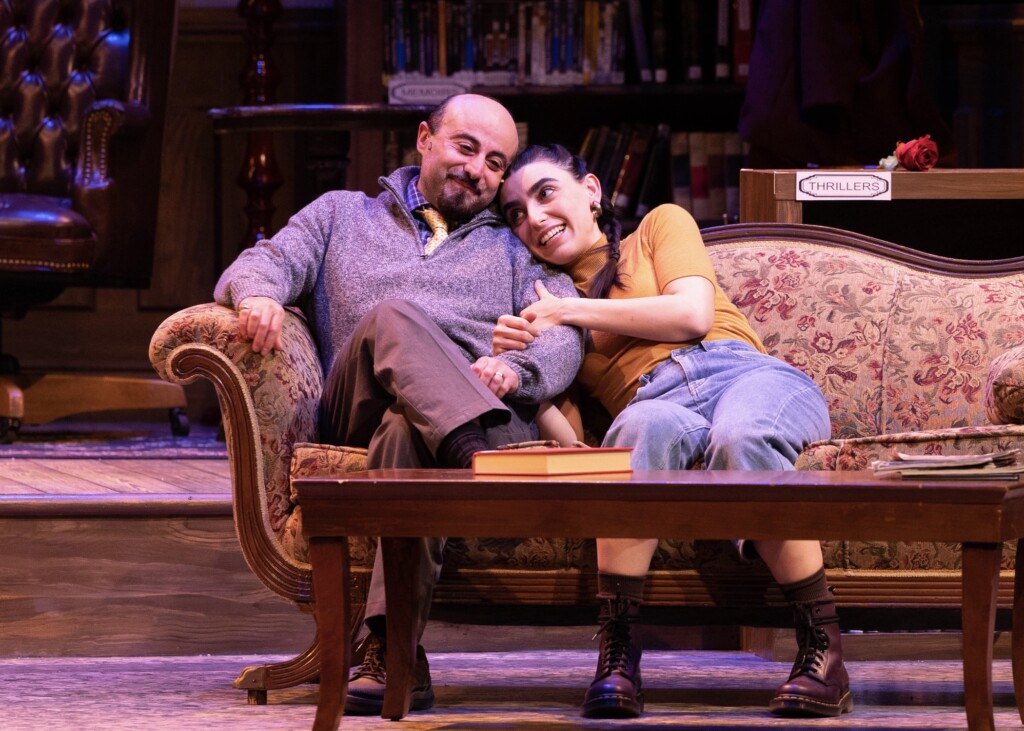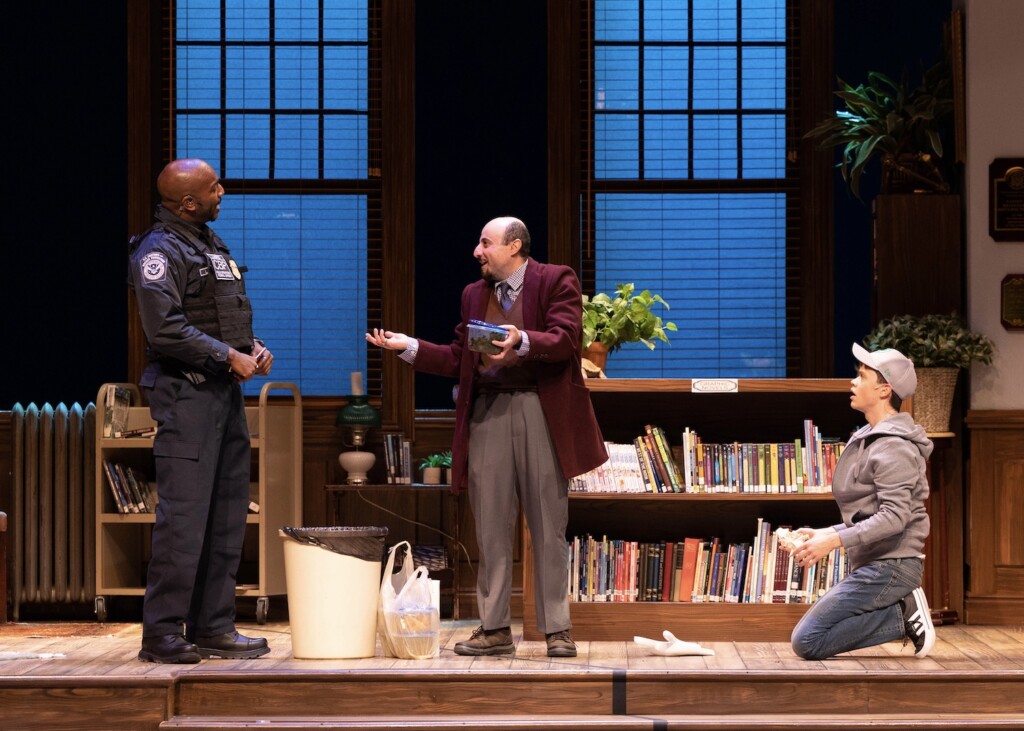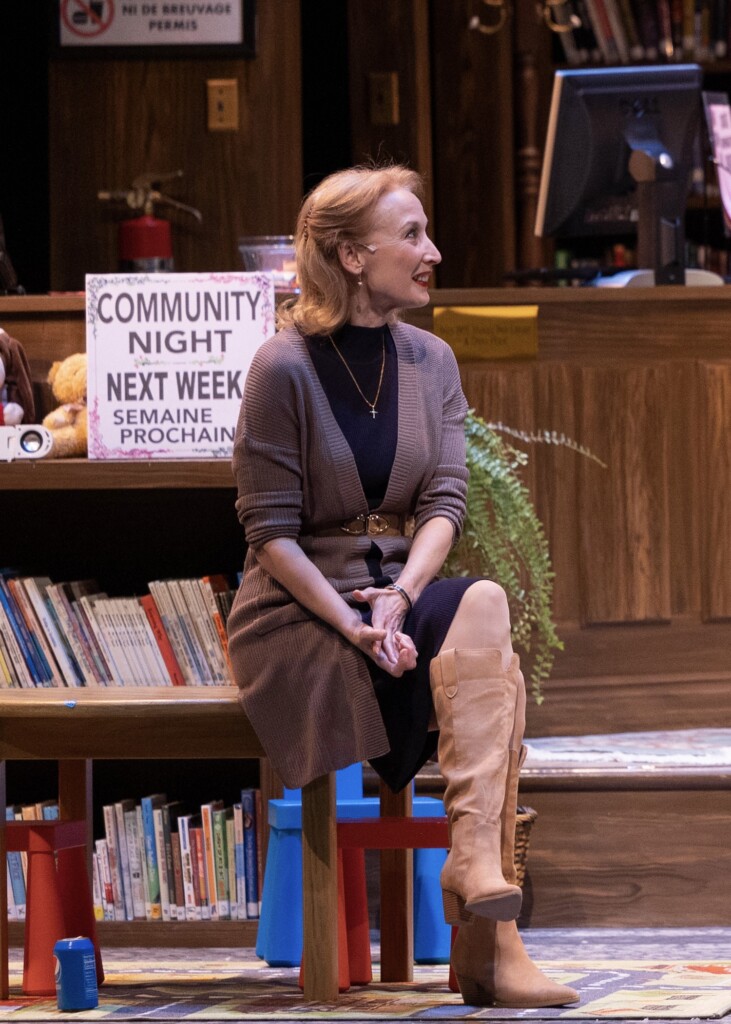In the middle of the superb world premiere production at the Pioneer Theatre Company (PTC) of Kareem Fahmy’s A Distinct Society, Peyman, an Iranian cardiac surgeon, tells Manon, who runs the tiny Haskell Free Library straddling the Canadian-U.S. border, “When I was young my father told me: ‘Peyman, politics is shit. Ignore politics, and it will ignore you.’”
Peyman’s grounded practicalities provide the elucidating counterpoint to Manon, a Québécois woman who relishes being a freewheeling enigma. It is November 2017 and the once-sleepy library has become visible and significant for families affected by the ‘Muslim Ban’ being enforced by the American Customs and Border Patrol (CBP).
Worried about his daughter, who is in medical school in Boston, Peyman had arranged to meet her at the library to bring her food. Returning to the library for a second time, Peyman hopes to see Shirin for sure this visit, even if it is limited to just five minutes.

Manon (rendered by Carrie Paff in rich textures, moving back and forth between feminist icon and damsel) wonders why Peyman (played with exquisite nuance by Abdullah Khalil), who went to medical school in Boston, would have given up the opportunity to stay in the U.S., instead of returning to Iran to work as a surgeon. He says, “Even back then I felt it… I would never be truly welcome. I finished school, then went back to Iran. Even though it was no longer the place I’d loved as a child.” When asked about why he decided to go back to Iran, Peyman tells Manon, “Because I recognized that for me my home is not my country; my home is my family.”
Rich in foreshadowing, thematic symbolism and relevance with dialogue hitting all of the right beats, this exchange exemplifies the strength of every scene that Fahmy has crafted so deftly for the play. A Distinct Society is in the last week of its world premiere run at Pioneer Theatre Company in association with TheatreWorks Silicon Valley. With spot-on direction by Giovanna Sardelli, the production excels on all levels. The five-member acting ensemble nail every rhythm and emotion with authenticity, magnifying the solid credibility of Fahmy’s script.

Having lived in southeastern Quebec in the heart of A Distinct Society’s setting, Fahmy, a Canadian-born playwright who has Egyptian roots, is familiar with the real-life library, along with a community where not only international borders intersect but also the simmering dynamics of the fear of the stranger sentiment, which affect the lives of all five characters in various ways.
Manon is proud of her French Québécois identity. She was just 18 when she voted for Quebec to secede and become its own nation — that is, “ a distinct society.” Bruce (played pitch perfectly by Corey Jones) is an American CBP officer who has just been reassigned from Detroit to this remote outpost. He was reprimanded for allowing a young Yemeni track athlete, who was going to Ann Arbor to compete, to pass through the checkpoint without being thoroughly vetted, in case he might be a jihadist.
Bruce is enchanted with Manon but he also is resolved not to make the same mistake in his job, much to Peyman’s dismay, as the play shows. Shirin (played by Vaneh Assadourian who captures her character’s forthright tone consistently) adores her father, who is thrilled to see her follow in his footsteps. But, also her experiences in medical school have compelled her to reconsider her future.

The youngest character is Declan (played with astute credibility by Emmet Smith), who has just turned 16 and sees getting his driver’s license as the opportunity to experience the freedom of his own identity. He moved to Quebec from Northern Ireland, so his parents could pursue their research as sheep geneticists. Declan’s parents have divorced, with his father returning to Northern Ireland and his new family. The family circumstances have only aggravated Declan’s isolation and resentment of living in a place and going to school where the French language and the Québécois identity are central to social connection and acceptance. A lover of graphic novels, he seeks refuge in the library to quench his thirst for escapism. He is desperate for validation from an adult who does not treat him like a child.
In recent years, many filmmakers, poets, visual artists, and writers from the Middle Eastern diaspora have succeeded with stories where the human experience is not defined primarily by the politics of the moment but instead by the human spectrum of emotions — positive and negative, resilient and vulnerable, affirmation and abandonment — which any newcomer is likely to experience in an unfamiliar community.

This is why the setting of A Distinct Society makes for a potent comprehensive representation of the messages to be drawn from such stories. As Bruce and Manon explore their mutual romantic attraction, he asks her about the meaning of a distinct society — a skillfully executed scene foregrounding the epiphanies that will emerge.
Bruce is caught off guard by the tragic undertones of Manon’s story recounting the time when Québéc and families like hers decided if they should or should not secede from Canada. Meanwhile, Peyman’s presence presents unexpected opportunities for Manon to reconcile her past and her guilt.
After the narrow defeat of the referendum for secession in 1995, many in the Québécois movement moved on but what also has emerged more recently are more conservative expressions of nationalism to protect against the diversification of the population of Québéc. Immigrants have spread from the cosmopolitan urban center of Montreal to many small communities across the Canadian province— the land of “cows and churches,” a phrase mentioned periodically in the play’s dialogue. The growing presence of newcomers ironically falls in line with Ottawa’s open door approach to immigration. In Manon’s formative years, the enemy was English-speaking Canada and an overbearing American presence. But, in 2017, the threat also can be triggered by a Muslim presence where, for example, pungent Persian cuisine shares the table with tourtière, a staple of French Canadian food traditions.

Another dynamic in the relationship between Bruce and Manon, which Fahmy handles elegantly in his writing, is the head librarian’s love of Carmen, the main character in one of the operatic canon’s greatest warhorses. Bruce is drawn to Manon’s singing and becomes more curious about her love of a classic femme fatale role who proclaims that she will never be caged. There is an intriguing parallel between the onstage romance and the libretto of Bizet’s most famous work. Carmen is infatuated with and seduces Don José, who is a local army sergeant. She convinces the sergeant to upend his life of duty and obligations. In the play, Bruce is certainly conflicted, given that he already had been questioned about his capacity to act authoritatively in his CBP role. Manon’s spirit cannot be compromised, even if Bruce believes that the power of his own male gaze would be enough for Manon to abide and support what he needs to do.
A Distinct Society is an outstanding production on all counts. The set design evokes the desired sense of the library as a community living room (Jo Winiarski). As dialect coach, Sarah Shippobotham has prepared the actors to be credible in their respective portrayals. This particular performance was in the middle of the production run and the pacing and cadences have ripened fully.
Fahmy is a playwright whose works have gained well-deserved visibility. He has worked previously at Pioneer Theatre Company and around the country— including Artists Repertory Theatre, City Theatre, InterAct Theatre, TheatreWorks Silicon Valley, Writers Theatre, Atlantic Theatre Company, Denver Center, and Northlight Theatre. He is a co-founder and chair of the Middle Eastern American Writers Lab.
For more information about A Distinct Society and tickets for the production, which closes Feb. 11, see the PTC website.
